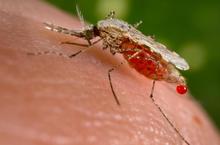The Georgia Department of Agriculture has confirmed another positive case of Eastern Equine Encephalitis (EEE) in a horse in Brooks County. This is the second positive case of EEE found in a horse in the area and the fourth case of EEE in an animal in the South Health District in Georgia this year.

Mosquito engorged with blood
The Georgia Department of Agriculture has confirmed another positive case of Eastern Equine Encephalitis (EEE) in a horse, making this the fourth case in the district this year.
© 2013 by USCDC
Eastern Equine Encephalitis is the inflammation or swelling of the brain caused by the eastern equine encephalitis virus and is regarded as one of the most serious mosquito-borne diseases in the United States according to the Centers for Disease Control and Prevention.
EEE virus attacks the central nervous system and unvaccinated horses are very susceptible to the infection. The disease appears within five days after a mosquito transmits the virus to the horse. Onset of clinical symptoms are abrupt and infected horses often die within three days.
The fatality rate is 90% or higher and an animal that survives the disease may have brain damage.
Symptoms of EEE in horses include:
- Fever
- Sleepy appearance
- Muscle twitches in head, neck, shoulder and flanks
- Staggering gait
- Recumbency
The EEE virus is transmitted to humans and horses through the bite of an infected mosquito;
however, the illness is rare in humans. The EEE virus normally only circulates between birds and mosquitoes in swampy areas. According to research, EEE is not transmitted from person to person, horse to horse, or horse to human.
Although most people will not become sick, people are encouraged to take precautions when outdoors. Anyone that is outdoors should do all they can to protect themselves and others from the bites of mosquitoes.
In all cases, the population of mosquitoes should be controlled as much as possible by following the recommendations of mosquito-control personnel and the agencies in the area where horses are kept.
Any bodies of stagnant water should be drained and water-holding containers such as buckets, tires and other receptacles where water might accumulate should be emptied. Horse troughs and waterers should be flushed often to reduce mosquitoes near paddock areas.
Insecticides for treating mosquito nesting areas around homes and livestock premises should be used on a regular basis.
Horses should be vaccinated against EEE annually.
Learn more about Mosquito-borne horse diseases
